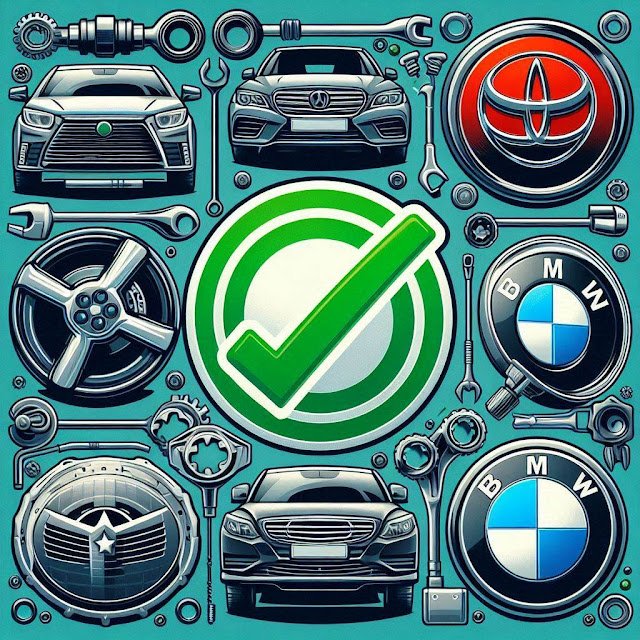Maintaining the durability and longevity of your vehicle is essential to ensure it operates efficiently and safely. One of the most crucial factors in keeping your vehicle in top condition is the use of genuine auto parts. These parts are designed and manufactured specifically for your vehicle by the original equipment manufacturer (OEM). Choosing authentic parts over cheaper alternatives can have a significant impact on your car’s performance, safety, and long-term value. Here’s why genuine auto parts are vital for your vehicle’s durability:
1. Optimal Performance and Fit
Genuine auto parts are made to the exact specifications of your vehicle’s make and model. Unlike aftermarket parts, which can vary in quality and design, OEM parts are identical to the components originally installed in your car. This ensures:
- Perfect fit: Genuine parts fit seamlessly, reducing the risk of improper installation or additional wear on neighboring components.
- Consistent performance: OEM parts are engineered to maintain the original performance of your vehicle, ensuring it runs as smoothly as when it was first assembled.
Example: A genuine brake pad is designed to match the friction characteristics of your vehicle’s braking system, ensuring reliable stopping power, while an aftermarket pad might wear out faster or produce inconsistent braking.
2. Longevity and Durability
One of the main advantages of using genuine parts is their durability. Since they are built to meet the manufacturer’s standards, these parts are tested rigorously to last as long as the original components they replace. Genuine parts are made from high-quality materials and undergo strict quality control, which translates into:
- Extended lifespan: You won’t need to replace genuine parts as frequently as cheaper alternatives, saving money in the long run.
- Reduced wear and tear: Since they fit perfectly and work in harmony with your vehicle’s other components, genuine parts reduce the overall wear and tear on your car.
Example: A genuine timing belt will last for the recommended duration, ensuring smooth engine operation, while a low-quality replacement could break prematurely, causing severe engine damage.
3. Safety Assurance
Safety should always be a top priority when maintaining your vehicle. Genuine parts are tested under extreme conditions to ensure they meet safety and quality standards set by the manufacturer. This reduces the risk of part failure, which could lead to accidents or breakdowns.
- Certified and tested: OEM parts are subjected to rigorous testing for safety, including crash tests, heat resistance, and stress tests, ensuring they can withstand various conditions.
- Warranty protection: Many manufacturers offer warranties on their genuine parts, providing peace of mind that you’re covered if anything goes wrong.
Example: Using a genuine airbag or brake system component ensures that your vehicle’s safety features will work effectively in the event of a collision, unlike some aftermarket parts that might compromise safety.
4. Preserves Vehicle Value
If you plan to sell or trade in your vehicle in the future, using genuine parts can help maintain its resale value. Buyers and dealerships often look for vehicles that have been well-maintained with original components, as this signals reliability and lower chances of future issues.
- Resale appeal: Vehicles serviced with OEM parts are more attractive to buyers, as they are more likely to be free from performance or safety concerns.
- Manufacturer standards: Using genuine parts ensures your vehicle adheres to the manufacturer’s standards, which is often a requirement for maintaining warranty coverage.
Example: A car with genuine engine parts and an intact service history will likely fetch a higher price than one with questionable aftermarket components, which might raise doubts about the vehicle’s condition.
5. Warranty and Support
Many auto manufacturers provide warranties for both their vehicles and the replacement parts. This means that when you use genuine parts, you are not only ensuring better quality but also protecting yourself from unexpected repair costs.
- Warranty protection: Genuine parts typically come with a warranty, which can cover repairs or replacements if the part fails within a certain time frame.
- Vehicle warranty: In some cases, using non-genuine parts can void your vehicle’s warranty. To avoid this risk, it’s important to stick with OEM parts.
Example: If your car is under warranty, using an aftermarket part that causes damage may leave you responsible for costly repairs that would have otherwise been covered by the manufacturer.
6. Lower Long-Term Costs
While aftermarket parts may be cheaper upfront, they often come with hidden long-term costs. These can include more frequent replacements, reduced fuel efficiency, and potential damage to other components of your vehicle. In contrast, genuine parts may have a higher initial price, but their durability and performance translate to lower overall costs.
- Fewer replacements: Genuine parts last longer, meaning you won’t have to pay for replacements as frequently as you would with cheaper alternatives.
- Prevents costly repairs: Since genuine parts fit perfectly and function as intended, they reduce the likelihood of causing additional damage to your vehicle, preventing costly repairs down the road.
Example: A low-quality fuel pump may fail prematurely, leading to engine damage and expensive repairs. A genuine fuel pump, on the other hand, will deliver consistent performance and help avoid these issues.
7. Compatibility with Modern Vehicle Technology
As vehicles become more technologically advanced, the need for precise and compatible parts grows. Modern cars often rely on complex systems like electronic control units (ECUs), advanced safety features, and hybrid powertrains. Genuine parts are designed to integrate seamlessly with these systems, ensuring that all components work together without causing malfunctions.
- Software compatibility: Genuine parts often come with software updates that are needed for your car’s computer system to recognize and optimize their use.
- Advanced technology: In vehicles equipped with high-tech systems, such as adaptive cruise control or automatic emergency braking, using OEM parts ensures that these systems function properly.
Example: An aftermarket sensor might not communicate properly with your car’s ECU, leading to incorrect readings or malfunctions in safety features, while a genuine sensor would integrate smoothly with the system.
Conclusion
Using genuine auto parts is a key factor in maintaining the durability, performance, and safety of your vehicle. Although they may come at a higher cost initially, OEM parts offer a superior fit, extended lifespan, and better integration with your vehicle’s technology. They also preserve the resale value of your car and ensure that you remain within the manufacturer’s warranty and safety standards. In the long run, investing in genuine parts is the best way to ensure your car remains reliable and efficient while avoiding costly repairs and replacements.




